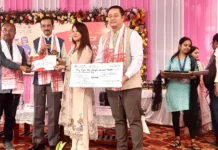[ Jumge Pale ]
The model code of conduct (MCC), either operative or inoperative, plays a lesser role. Even prior to the commencement of the electioneering process, which is guided by the MCC, the government officials are to comply with the CCS conduct rules.
As per the CSS Conduct Rule No 5, government officials’ participation in political rallies and campaigns goes against the rules. However, one cannot deny the fact that in Arunachal Pradesh, the majority of the government employees are keen on politics and ignore the official responsibilities assigned to them.
The recently concluded state assembly and parliamentary elections witnessed gross violation of the MCC guidelines and the Representation of People Act. The majority of the government officials actively engaged in political campaigns and rallies, and induced their kith and kin to vote for the political party leader of their choice. It happens because in Arunachal any member of a family who is recruited in the government sector is solely dependent and relied upon, and a family member who is in government employment takes advantage of the situation and influences the voting and electioneering processes.
Such dependence is the root cause of eroding the essence of democracy. It is imperative to be cognisantof the fact that the MCC is generally applicable to the aspiring candidates and government officials, but in Arunachal the government employees celebrate it. Who can deny this fact? The sitting MLAs and aspiring MLAs immediately get in contact with the high-level government officials and encourage them to actively participate in the electioneering process, and they are the deciding factors.
Teachers are considered the torchbearers of the society on whose soldiers the responsibility of reforming the society lies. But the promoted teachers in high positions have been seen carrying bags of money and inducing the voters even on the day of polling.
Gross violation of the MCC was seen when the BJP’scandidates for the posts of MPs and MLAs forced the government officials to cast their votes in favour of the BJP candidates, and warned that whoever refrained from voting for the BJP candidates would face dire consequences.
So the question is, if the lawmakers turn into lawbreakers, where is the place for shelter?
The NPP members also filed complaint letters on the desk of the chief electoral officer and the DEOs concerned, but no bigger development waswitnessed. If there was any progress, the authority concerned might have come for a press briefing.
At some of the polling stations in Arunachal, the supporters resorted to checking public vehicles and intruding into privacy, causing mental harassment and torture. It is the duty of the law enforcing authorities to ensure that the MCC guidelines are complied with, but the intervention of local supporters without consent is unruly and unwelcome.
It was also reported that, due to the inflow of huge amounts of money during the elections, the legit voters sold their votes to two parties, and later the two political parties designated two queues, one for the BJP supporters and the other for the NPP supporters, in order to figure out who cast their vote for which party.
If such practices prevail, can democracy prevail?
The inflow of money was to the extent that unreliable voters were asked to videograph the EVM inside the voting compartment.
Considering the circumstances, to practice true democracy in Arunachal, the people should avoid regional and communal politics and the money culture. The practice of regional and communal politics has also germinated mobocracy and is eroding democracy.
The government cannot deny the fact that, due to insufficient police personnel and administrative staffers, the MCC could not be enforced in toto.
In order to streamline the practice of democracy and educate the masses about the importance of voting, the Election Commission of India and the chief electoral officer in the state shouldn’t be on their toes during elections time only. The department concerned should remain alert and generate awareness among the masses by reaching the un-reached people. The educated youths should play a pivotal role in providing awareness to the ignorant masses, instead of promoting narrow mindset and making them reelunder the regional and communal mindset and restricting them from broadening their ignorant mindset. (The writer is the managing director of the Arunachal Informer)

